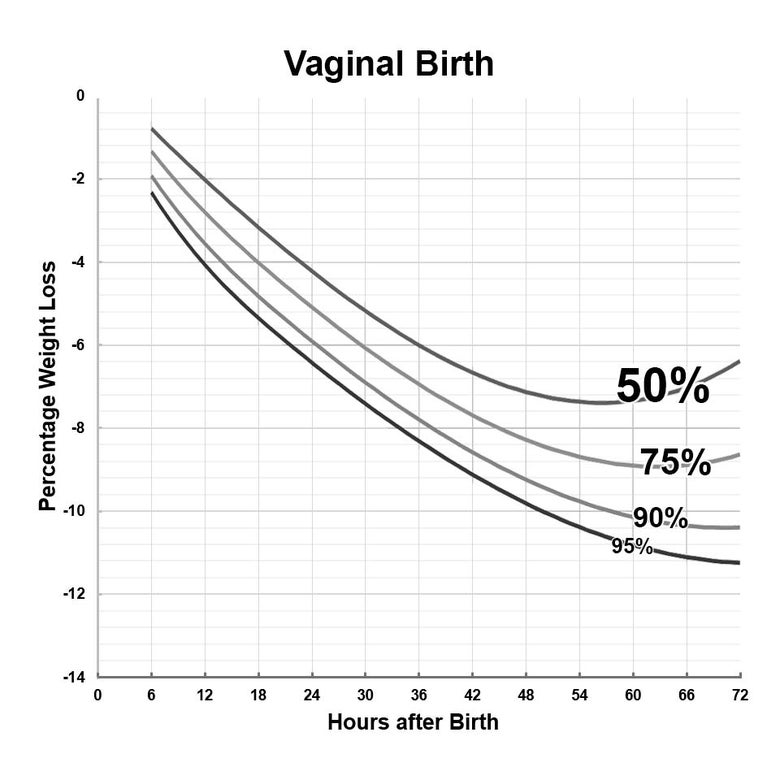When Do You Lose Your Baby Stomach After Giving Birth
Virtually All Infants Lose Weight After They're Born. So Why Do Hospitals Focus on Information technology So Obsessively?

It's ridiculous how many expectations and conventions exist effectually childbirth and parenting. But over the class of writing two books about this fourth dimension of life, I've come to appreciate that there are some things you lot simply tin not anticipate: things people don't talk near, sometimes considering they are sad, sometimes uncomfortable, sometimes just plain weird. I remember nosotros should talk about them—and, more than that, nosotros should utilize data to really understand them. (I'm an economist; I honey information). Acknowledging the data can frequently relieve a lot of the pressure on parents, either past reflecting experiences that experience isolating in the moment or by presenting u.s. with a greater range of choices than nosotros might have thought nosotros had. In that spirit, I accept a serial in Slate this week most how data helps illuminate childbirth and parenting's nigh underdiscussed topics.
My first child, Penelope, was built-in at 6 a.m. Every bit a result, our insurance covered two nights in the hospital. On our second nighttime—when my hubby had gone home to rest and prepare the house for our return—the nurses took Penelope for some tests and returned her at 2 a.grand. I was sleeping. The nurse switched on the lite and rolled the bassinet in; in addition to Penelope, the bassinet had a little sign: Breastfeeding Merely.
"Nosotros weighed her," the nurse said, "and she's lost eleven percent of her trunk weight. Our limit is 10 per centum, and so you lot'll accept to commencement supplementing with formula. If you don't, you probably won't get to have her habitation tomorrow." I felt rising panic—not accept her dwelling?—and also some confusion. 10 percent versus xi pct? These seemed pretty like—was that one percent really enough to foreclose an otherwise healthy infant from coming home?
Obviously, you want your babe to thrive, and weight is an important metric. But many new parents are not expecting the tremendous focus doctors and hospital staff place on infant weight gain or loss. If you accept happily given nascency to a healthy baby after a relatively uneventful delivery, the vast majority of your hospital conversations will now revolve around the baby's feeding and weight. That might audio like a fine thought, merely recall this is not a moment you are at your near laissez-faire. When you're just postpartum and trying to breastfeed for the starting time time, it can be incredibly tense. It can feel like you are failing—you did such a great job growing this infant inside you, and at present that it's out, you are a failure. (Yous're not!! That'southward just how it feels.)
Here is the start thing to know: well-nigh all infants lose weight after birth, and those who are breastfed lose even more. The mechanisms for this are well understood. In the womb, your baby is getting nutrients and absorbing calories through the umbilical cord. Once the babe is out, he has to figure out how to eat. It is complicated (for both of you), and in the outset few days, you won't yet have a lot of milk.
Infant weight is monitored pretty carefully in the hospital. Every 12 hours or so, they'll counterbalance the baby and maybe come back to report alter in weight to yous. Broadly, the reasons for weight monitoring are expert ones. Weight loss is non an issue in and of itself, but excessive weight loss can indicate a problem with feeding—that breastfeeding isn't working successfully, for example. This tin exist a clue that newborns aren't getting enough liquid, which puts them at chance for aridity. Dehydrated babies may then struggle more to feed, and you go a downward spiral. In principle this tin can have severe consequences, but these are rare.
Monitoring weight is about catching possible problems early, when you tin can fix them, and effective monitoring requires understanding how much weight newborns typically lose. Generally, we want to consider something a problem if it's style exterior the normal range. If almost babies lose ten per centum of their weight, so we shouldn't worry when that happens. Nothing in biology tells you lot that a baby losing ten pct of its nascence weight is a trigger for issues.
Figuring out the range of normal newborn weight loss requires data that, until recently, hasn't been that easy to come by. In 2015, however, a set of authors published a really prissy paper in the periodical Pediatrics that used information from infirmary records on 160,000 births to graph out the weight loss among breastfed infants in the hours after birth.

The graph below shows a version of this report's results for breastfed babies who were born vaginally. The horizontal centrality shows infant age in hours; the vertical axis shows the pct weight loss. The lines indicate how much this varies. The peak line, for example, shows the weight loss path over time for the baby at the 50th percentile of weight loss.
From these figures, you tin read both the average weight loss and the range. For example, at 48 hours, the average infant born vaginally has lost 7 percent of body weight, and v percent of infants have lost more than 10 pct. For at to the lowest degree some infants, weight loss continues through 72 hours.
On average, babies born by caesarean section lose a scrap more than weight than those built-in vaginally, probable because chest milk is usually a fleck more than delayed after a C-department. Babies who are formula-fed typically practise not lose much at all (since formula doesn't need time to come in).
When I had Penelope, the rule in the infirmary was that if babies lose more than x percentage of their trunk weight, you supplement. But y'all can see from the graphs that whether this is a reasonable cutoff depends tremendously on when the measurement is taken and the infant's particular circumstances. At 72 hours, 10 percent weight loss is inside the normal range. At 12 hours, it would exist a serious outlier. The authors of this paper created a very nice website where you can enter the time of nativity of your child, method of nascency, method of feeding, birth weight, and current weight, and learn where your baby is in the distribution.
If you do detect, as I did, that your infant has gone over the weight loss limits, what should you practise? Typically, hospitals volition recommend supplementing with formula for a brusque flow. Supplementation would rarely be recommended before 48 or 72 hours, then information technology'due south useful to pay attending to your baby'southward weight earlier that. If she's losing weight quickly, trying to figure out why may brand sense.
A final note: The major concern about weight loss is that it signals dehydration. But this is likewise something you lot tin monitor directly. If your baby is peeing with some frequency and does non have a dry tongue, there'south a very good take chances he's not dehydrated. Conversely, if you do come across these signs, supplementation may be a skillful idea fifty-fifty if in that location isn't too much weight loss.
The extensive focus on weight and feeding is enough to really scare a lot of new parents—myself included. Simply the data here should exist reassuring. Some pretty substantial weight loss is totally normal, fifty-fifty expected. So don't be surprised, and don't panic. Fifty-fifty when you're trying and failing to feed an infant at two a.m.

Slate has relationships with various online retailers. If y'all purchase something through our links, Slate may earn an chapter commission. We update links when possible, but annotation that deals can expire and all prices are field of study to change. All prices were upwardly to date at the time of publication.
Source: https://slate.com/human-interest/2019/04/cribsheet-newborn-infant-birth-weight.html
0 Response to "When Do You Lose Your Baby Stomach After Giving Birth"
Post a Comment